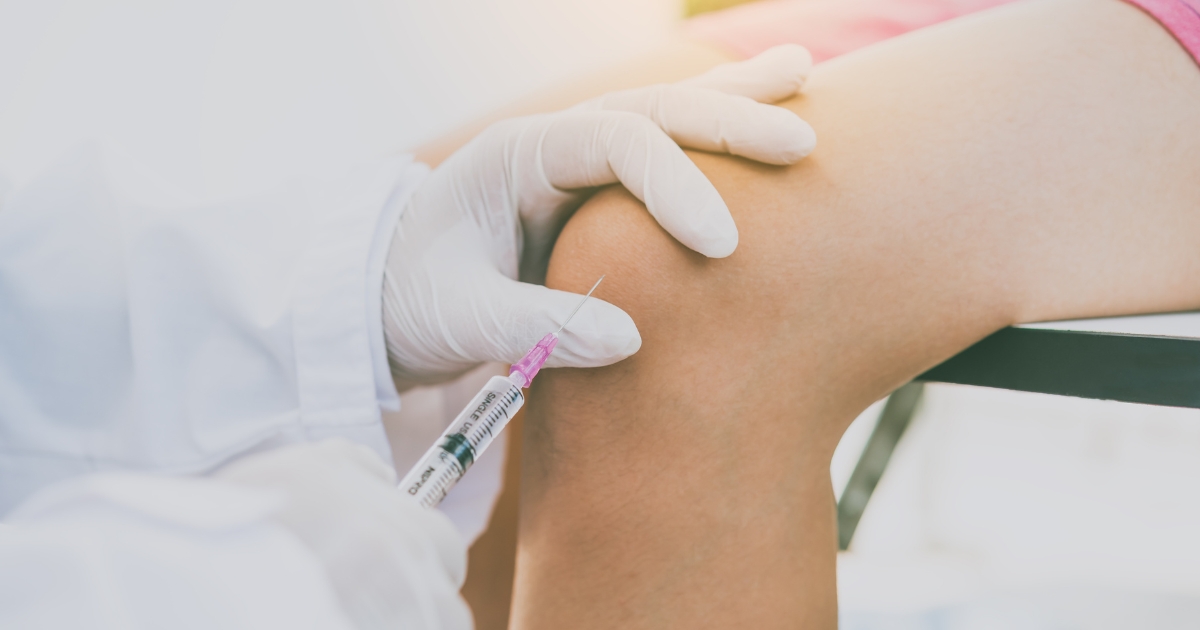Knee injections are a common treatment for various knee-related issues. They are applied to enhance movement, lessen inflammation, and ease discomfort. Often recommended when other treatments fail, knee injections can be a vital part of managing knee conditions.
This blog attempts to provide you a thorough rundown of everything you need know about knee injections, including the method, outcomes, and any hazards.
Understanding Knee Injections
What Are Knee Injections?
Knee injections involve administering medication directly into the knee joint. They serve various purposes depending on the type of injection used.
- Corticosteroids: These are anti-inflammatory drugs that help reduce pain and swelling.
- Hyaluronic Acid: This injection aims to lubricate the joint, mimicking the natural fluid in the knee to improve mobility and reduce pain.
- Platelet-Rich Plasma (PRP): This involves injecting a concentration of platelets from your blood into the knee to promote healing and reduce inflammation.
Why Are Knee Injections Used?
Doctors often use knee injections to treat conditions like osteoarthritis, where the cartilage in the knee gradually wears down over time. They can also be effective for inflammation from injuries or chronic conditions.
When alternative therapies, including physical therapy or medicine, are not effective enough to relieve the condition, doctors will suggest knee injections. The goal is to alleviate pain and improve the quality of life for those affected by knee issues.
The Knee Injection Process
Preparation
Before your knee injection, you will undergo a thorough consultation with your healthcare provider. This step is crucial to ensure that the injection is appropriate for your condition.
Your doctor will talk with you about your symptoms, go over your medical history, and examine your knee at this appointment. In order to accurately direct the injection and determine the severity of the problem, they may also request imaging tests, such as MRIs or X-rays.
Wear loose, comfortable attire that will enable for easy access to your knee on the day of the surgery. This helps the healthcare provider perform the injection smoothly. You may need to adjust your medication regimen before the injection.
For example, your doctor might advise you to stop taking blood thinners or anti-inflammatory drugs a few days before the procedure to reduce the risk of bleeding or bruising. In some cases, healthcare providers may ask you to fast for a few hours if sedation is involved, though this is less common for knee injections.
During the Procedure
The knee injection procedure generally takes about 15 to 30 minutes. Here is a step-by-step breakdown of what to expect:
- Preparation: You will be comfortably positioned, often lying down or sitting with your knee slightly bent. To reduce the chance of infection, the medical staff will apply an antiseptic to the area surrounding your knee.
- Anesthesia: To minimize discomfort, a local anesthetic may be administered. This numbs the area around the knee and helps reduce pain during the injection. You might feel a brief sting or pinprick when the anesthetic is injected.
- Injection: The doctor will inject the drug into the knee joint using a needle after numbing the area. They may use imaging techniques, such as ultrasound or fluoroscopy, to ensure the needle is correctly positioned. You may feel some pressure or a brief sharp sensation as the needle enters the joint.
- Completion: After the injection, the healthcare provider removes the needle and cleans the area again. They may ask you to remain in the clinic for a short time to monitor for any immediate reactions.
After the Procedure
Post-injection care is essential for optimal recovery and effectiveness. Here is what to expect and how to care for your knee:
- Immediate Experience: You might feel some discomfort or swelling where the injection was made afterward. This is a normal response and should gradually improve. It is common to feel a bit of discomfort as the local anesthetic wears off.
- Activity Restrictions: Your doctor will provide specific guidelines on activity. Generally, it is advisable to rest for the first 24-48 hours after the injection. Steer clear of hard lifting and activities that could strain your knee. Gentle movements and low-impact exercises may be encouraged to maintain joint flexibility.
- Ice Application: Ice packs applied to the knee might help reduce pain and swelling. Apply an ice pack covered in a rag to the knee and leave it there for 15 to 20 minutes every few hours over the first day or two. This may numb the region and lessen irritation.
- Pain Management: Acetaminophen or ibuprofen, two over-the-counter pain medications, can assist manage any lingering discomfort. Avoid taking nonsteroidal anti-inflammatory drugs (NSAIDs) if your doctor has advised against them, as they can interfere with the injection’s effectiveness.
- Follow-Up: Make an appointment for a follow-up visit with your healthcare provider to go over any concerns and evaluate the effectiveness of the injection. They will evaluate how well the injection has worked and decide on any further treatment if needed.
You may optimize the advantages of your knee injection and aid to ensure a speedy recovery by according to these recommendations.
Expected Outcomes
Immediate Effects
You may start to feel relief within a few days of the injection. However, some people experience mild soreness, swelling, or redness at the injection site. You can usually manage these temporary side effects with ice and over-the-counter pain relievers.
Long-Term Results
The relief from knee injections can vary. Corticosteroid injections may provide relief for a few weeks to several months, while hyaluronic acid injections may last up to six months. PRP injections might require multiple sessions for optimal results. If your condition persists, further injections may be needed.
When to See a Doctor?
If you experience severe pain, increased swelling, or signs of infection like fever or pus, contact your doctor immediately. These could indicate complications that need prompt attention.
Benefits
Knee injections can provide significant pain relief, improve joint function, and delay the need for surgical interventions. They help reduce inflammation and can enhance mobility, making daily activities more manageable.
Knee injections may not be suitable for everyone. People with infections in the knee, certain allergies, or specific health conditions may need to explore alternative treatments. Consult with your healthcare provider to determine if knee injections are appropriate for you.
Knee injections can be an effective solution for managing knee pain and improving joint function. Understanding the procedure, expected outcomes, and potential benefits can help you make informed decisions.
Always consult with your healthcare provider for personalized advice and to determine the best treatment for your condition. To learn more or to schedule a consultation, reach out to your local specialist today.

